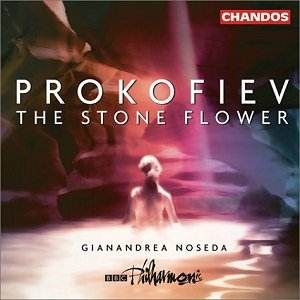This recording of The Stone Flower is
released to mark the 50th anniversary of the composer's death.
The Stone Flower ballet is contemporaneous
with the opera The Story of a Real Man. It was his last
ballet and as you can see from the timings is on an ambitious
scale inviting comparison with Cinderella and Romeo
and Juliet. The year was 1948. Prokofiev had put aside thoughts
of setting Pushkin's The Stone Guest in favour of a subject
with nationalist resonance. Folk material was required by the
invitation of Zhdanov's ‘spirit of the times’; an invitation not
to be denied.
The hero of the ballet is the artist Danilo.
His ‘grail’ is the stone flower hidden somewhere in the caverns
of the Copper Mountain. He needs it as the raw material for a
malachite vase. The supernatural Mistress of the Copper Mountain
guards the flower. Danilo finds it but is enchanted by the Mistress.
Katerina rescues Danilo and the flower is won. The villainous
bailiff, Severyan, is consigned to the earth.
A reference site for the detail of the plot is
www.sunbirds.com/lacquer/readings/1225
While comparisons will inevitably be made with
Romeo and Juliet the composer’s creative furnace, rather
like that of his close contemporary, Arnold Bax, had faltered
by the late 1940s - earlier in Bax’s case. Mind you there are
some fine and distinctive moments provided you are braced for
sackcloth and ashes along the way. For example, the invention
in most of Act III of The Stone Flower is fatigued. Amid
this workaday stuff comes Yuri Torchinsky's luscious oriental
serenade for the gypsy girl solo; a lovely piece in own right
complete with soughing piano (tr.13 CD2).
The first disc has most of the best bits. These
range from the rasping abrasion of the firmament excoriating trumpets
(tr.1) to stamping rhythmic material (tr.3) to a slippery little
tune contrasted with the distanced wooden rattle of castanets
(tr.14). There is a Rimskian ‘round dance’ like something from
Antar (tr.7) as well as diaphanous gauzy effects and whispered
violins (tr. 8. 1.03). The lovely oboe theme in track 9, infinitely
tender, is unnervingly similar to a Warlock song; I cannot quite
put my finger on which one. This theme is developed with mounting
passion by the violins. The wooing of Danilo by the Mistress is
portrayed strongly. He is lured with music that is scorchingly
supernatural - like an updated version of Grieg’s goblin music
in Peer Gynt (tr.16). I thought also of the invocational
music towards the end of Martinů’s
1959 Epic of Gilgamesh. Sadly the quality of the
music collapses in tracks 17-21. The Devil does indeed have good
tunes so it comes as no surprise that the Severyan episodes are
good. These include the peremptory trumpet interruption (tr.6
1.52) and suggestions of oppression afoot (tr.3 CD2) in the Mistress’s
Warning. The stomping nasal grouching of the tuba, horns and trombones
is to be relished (tr.12) as is the Balakirev style nationalism
deployed for Severyan’s Arrival (CD2 tr.5).
The second disc has its highlights, though fewer
than on the first disc. As a burden it carries the fatigued Act
III set-pieces in a hollow tribute (tr.10 - a creaky Russian Dance)
to the divertissement dances in Tchaikovsky’s ballets. Outstanding
are the lovely flute-outlined melody for Severyan and the workers
(tr.3) and Katerina's redemptively innocent theme (tr.14). Interlude
II (tr.9) is memorable for the novel textures projected by piano
and muted trumpets. Time and again the skills of the BBCPO violins
startle and delight as they do in the tenderness of Where Are
You Sweet Danilo? (tr.6). The Ural Rhapsody sports
stygian brass and pays its dues to nationalism although the coinage
is noticeably Prokofiev’s.
Act IV has a jittery fire spirit diverting Katerina
from her gloomy thoughts about the lost Danilo. The spirit leads
her back to the Mistress who reveals Danilo. He has been turned
to stone. Some imaginative orchestration, cousin to the mene
mene tekel upharsin music in Belshazzar’s Feast,
is used here. Katerina pleads her case for Danilo's return to
life and the Mistress concedes. A shared rapture suffuses the
orchestra but the Adagio misses the climactic payload of
similar episodes in Romeo and Juliet though the repeated
step-down note-cell for the french horns makes its mark. The momentary
epilogue carries much the same material ending gloriously ablaze
with salty dissonance.
Competition comes in the shape of one real contender
and another recording currently absent from the catalogue. CPO’s
1995-97 version with Michail Jurowski and the Radio-Philharmonie
Hannover des NDR is on CPO 999 385-2. In the mists of time you
will do well to find the version with Rozhdestvensky and the Bolshoi
Theatre Orchestra. This dates from 1968 and was issued in the
1994 on Russian Disc. There is also a VHS video (9031-76401-3)
with choreography by Yuri Grigorovich and the Maryinsky Theatre
Orchestra is conducted by Alexander Viliumanis. Colin Nears is
the director and the running time is 110 minutes. I have not seen
or heard these different versions though I have seen comments
disparaging of Rozhdestvensky because of allegedly brisk insensitive
tempi throughout.
I remember how disappointed I was when I first
heard Cinderella. Your expectations of Prokofiev in The
Stone Flower need to be realistic. There are satisfactions
here but amid material that just goes through the motions. Don’t
expect every page to hold your attention. I was rather more convinced
by his reviled later operas (Semyon Kotko and The Story
of a Real Man) than I am by this late ballet. Chandos, the
BBCPO and Noseda give the fillip of intensity that this music
deserves and make many moments rise up as classic Prokofiev.
Rob Barnett
